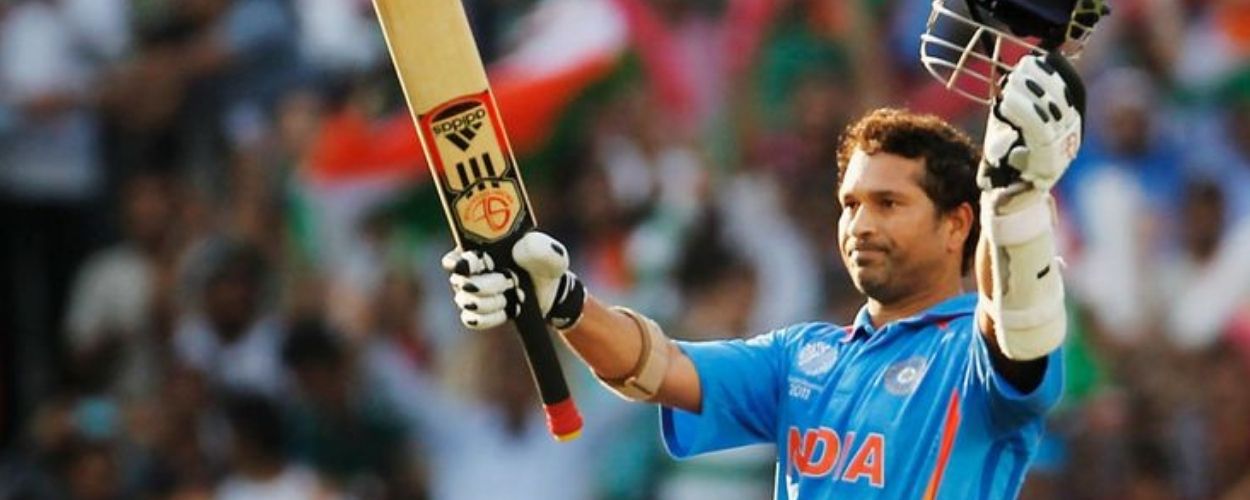Sachin Tendulkar is a former Indian international cricketer renowned for his extraordinary contributions to the sport. Often hailed as one of the most incredible batters in cricket history, Tendulkar’s career spanned nearly 24 years, during which he captained the Indian national team and achieved numerous records.
Early Life and Domestic Cricket:
Sachin Tendulkar’s journey in cricket began at the tender age of eleven. He debuted in the Ranji Trophy, India’s premier domestic first-class cricket tournament, on November 14, 1987, at 14. Despite not being selected for the final eleven, Tendulkar’s potential was evident. By December 11, 1988, he had made his first-class debut for Bombay (now Mumbai) against Gujarat at Wankhede Stadium, scoring an unbeaten 100. This innings made him the youngest Indian to score a century on debut in first-class cricket.
Tendulkar continued to impress in domestic cricket, scoring centuries in the Deodhar and Duleep Trophies. In the 1988-89 Ranji Trophy season, he finished as Bombay’s highest run-scorer with 583 runs at an average of 67.77. His performances in domestic finals were notable, including a crucial 96 in the 1990-91 Ranji Trophy final and a double century (204*) against the touring Australian team in 1998. Tendulkar’s first-class career also saw him score a memorable double century (233*) in the 2000 Ranji Trophy semi-final.
International Debut and Early Years:
Sachin Tendulkar made his Test debut on November 15, 1989, against Pakistan in Karachi at 16. His first series was marked by his resilience against the formidable Pakistani pace attack, including an incident where he continued batting despite being injured by a bouncer from Waqar Younis. In the 20-over exhibition match in Peshawar, Tendulkar scored 53 runs off 18 balls, including a remarkable over against Abdul Qadir.
Tendulkar’s international career began with promising performances, including his first Test century on August 14, 1990, at Old Trafford, Manchester. His innings of 119 helped India secure a draw against England.
Rise to Prominence:
During the 1991-92 tour of Australia, Tendulkar announced himself on the global stage with an unbeaten 148 in Sydney and a rapid 114 in Perth. These innings established him as one of the brightest young talents in cricket. Tendulkar’s performances during this period were instrumental in establishing his reputation.
Between 1994 and 1999, Tendulkar’s batting reached its peak. He scored two centuries as the leading run-scorer in the 1996 Cricket World Cup. His pivotal role in the tournament, including his century in the semi-final, cemented his status as a critical player for India.
Captaincy and Challenges:
Both challenges and notable successes marked Tendulkar’s captaincy. His first tenure as captain in 1996-97 was marred by poor team performance. Although he led India on a tour of Australia in 1999, where India faced a 3-0 defeat, Tendulkar was named Player of the Series. He later resigned as captain, with Sourav Ganguly taking over.
Tendulkar’s second stint as captain also faced difficulties, including a 0-2 Test series defeat against South Africa. Despite these challenges, he remained a dominant force in cricket, contributing significantly to various series and tournaments.
Later Career and Records:
Numerous records highlighted Sachin Tendulkar’s career. He became the first player to score 10,000 runs in One Day Internationals and set a world record with 100 international centuries. In February 2010, Tendulkar scored a double century in an ODI against South Africa, becoming the first player to achieve this milestone.
Tendulkar’s 100th international century came on March 16, 2012, against Bangladesh during the Asia Cup. Tendulkar’s achievement was celebrated globally despite India’s loss in that match.
Retirement and Legacy:
Sachin Tendulkar announced his retirement from One Day Internationals on December 23, 2012, and played his final Test match against the West Indies in November 2013. He also retired from the Indian Premier League (IPL) after leading the Mumbai Indians to victory in 2013. Tendulkar’s final Test innings saw him fall 79 runs short of completing 16,000 runs in Test cricket.
Following his retirement, Tendulkar continued participating in cricket and various philanthropic activities. He captained the Marylebone Cricket Club (MCC) in a match at Lord’s in July 2014 and was appointed ambassador for the ICC Cricket World Cup in 2011 and 2015.
IPL Career:
Tendulkar was a prominent figure in the Indian Premier League (IPL), where he played for the Mumbai Indians. As an icon player and captain, he led the team to victory in the 2013 IPL season and was honoured by the Mumbai Indians with the retirement of his jersey number 10. Tendulkar’s performances in the IPL included breaking the record for the most runs in a season and winning several individual awards.
Honours and Awards:
Sachin Tendulkar received numerous accolades throughout his career, including the Arjuna Award (1994), Khel Ratna Award (1997), Padma Shri (1999), and Padma Vibhushan (2008). In 2013, he was awarded the Bharat Ratna, India’s highest civilian honour, becoming the youngest recipient and the first sportsperson to receive the award. Tendulkar was also inducted into the ICC Cricket Hall of Fame in 2019 and included in Wisden Cricketers’ Almanack’s all-time Test World XI in 2013.
Impact and Influence:
Sachin Tendulkar’s impact on cricket and Indian sports is profound. His dedication, skill, and sportsmanship earned him admiration worldwide. His career has inspired countless young cricketers and contributed significantly to the growth of cricket globally.
